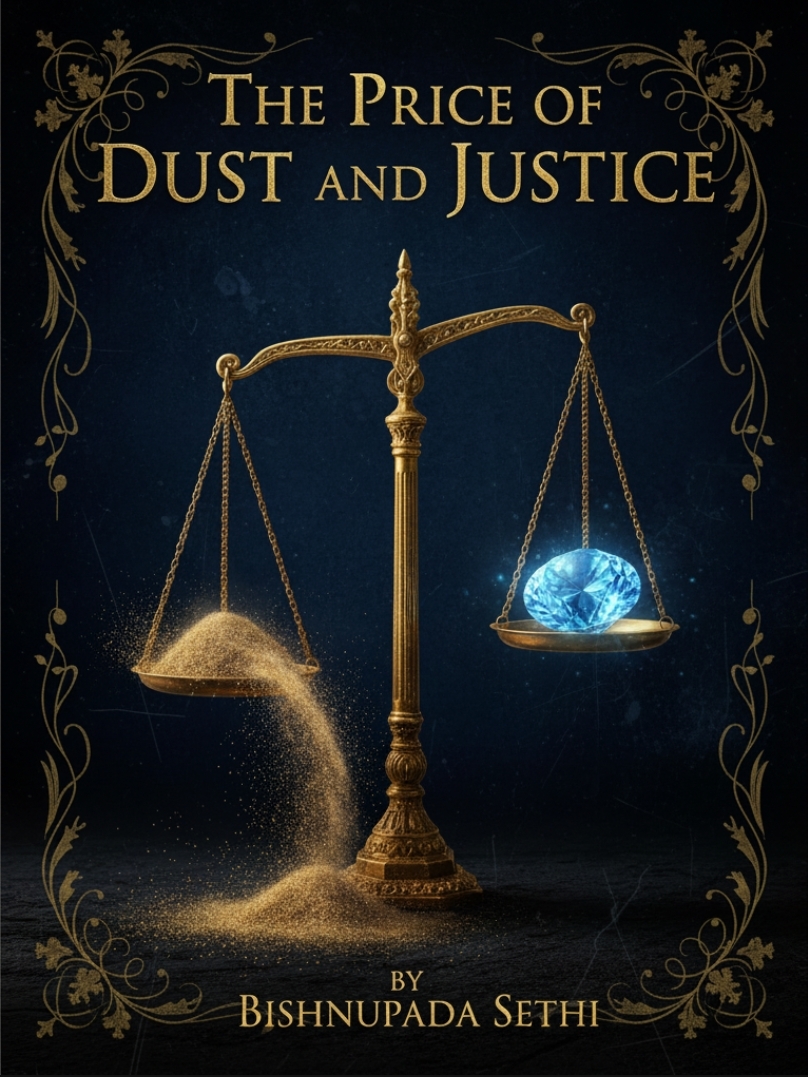The Price of Dust and Justice
The Price of Dust and Justice
A tale born from drought, duty, and defiance.
The summer of 2000 was not a season; it was a punishment. The sun did not rise — it ruled. Every dawn in Nuapada arrived with a hiss, burning the fields before the farmers even stepped out. Wells yawned empty, ponds cracked like shattered mirrors, and cattle ribs stuck out like the roots of dead trees. The wind carried no mercy, only the sting of sand and sorrow. Women walked miles with clay pots for a single drop of muddy water, and men sat in silence under leafless trees, waiting for a miracle that refused to come. In that silence, even God seemed absent.
Then, one June morning, the silence broke. A blue government jeep coughed its way down the dusty road, stopping before the district collectorate. From it stepped a young man — lean, sharp-eyed, his shirt folded neatly at the sleeves, carrying a steel trunk and a mind sharper than any weapon. His name was Bishnupada Sethi. He had come not to be served, but to serve; not to rule, but to repair. The villagers saw him and whispered — another officer, another visitor from the world of files and speeches. But they did not know — this man was different. This man had fire in his silence.
From his first day, he walked. He didn’t sit behind tables or sign papers like a ghost of governance. He walked through the hunger — from Khariar to Boden, from the cracked earth of Komna to the starving eyes of Chindaguda. He listened more than he spoke. He saw children chewing wild roots, mothers selling their bangles for rice, and middlemen feasting on drought relief funds meant for the dying. The system was a well-oiled machine of deceit — and he dared to jam its gears. He ordered transparency. He demanded honesty. He stopped trucks carrying rice and grain from being diverted to the black market. And in doing so, he struck the nerve of the powerful.
In the smoky corridors of the district’s ruling elite, the whispers grew dark. H.K. Bagarty, the Zilla Parishad President — a man who wore arrogance like a crown — saw Sethi’s honesty as an insult. A former sportsman turned politician, Bagarty was known for his temper, his muscle, and his reach. He had tamed officers before — bought some, broken others. But this one refused to bend. “He’s young,” Bagarty sneered one evening to his aides, “he’ll learn that honesty doesn’t feed you in Nuapada.” Yet, the Collector did not learn to bow. He learned to fight.
Every file he touched became a weapon; every visit, a challenge. He exposed fake muster rolls, ghost workers, and forged drought relief registers. His letters to the government were not reports — they were battle cries wrapped in bureaucracy. And slowly, the people began to believe again. The same villagers who once feared power now stood beside him. “Sethi Babu” became a name whispered with respect in the bazaars, in the panchayats, in the parched fields.
But honesty, in a land of corruption, is the most dangerous rebellion. The trap was set.
It was June 30, 2000 — a day heavy with dust and deceit. The Collector was visiting Khasbahal to inspect a relief camp. He was calm, unaware of what awaited. As he stepped out of his jeep, the air thickened. A crowd had gathered — not of villagers, but of men loyal to Bagarty. Shouts rose, faces twisted with rage, and before words could be spoken, blows rained down. The Collector — the representative of law — was assaulted, dragged, humiliated. His spectacles shattered, his blood mixed with the earth he had sworn to protect.
For a moment, time stood still. The same villagers who once bowed before power now stood frozen in disbelief. The very man who brought food to their empty bowls was bleeding before them. And then — silence again. Heavy, endless silence.
That night, in his quarters, Sethi sat with bandaged wounds and burning eyes. Instead of anger, he wrote — letter after letter, page after page — every line dripping with truth and defiance. He did not cry; he documented. He did not curse; he fought with words. Those letters reached Bhubaneswar, then Delhi. They carried not only the pain of one man but the voice of an entire land choked by corruption.
The aftermath was stormy. The state machinery shivered under scrutiny. Politicians whispered apologies, officers shifted their gaze, and people spoke — for once — without fear. But what power had tried to break, truth had made immortal. Bishnupada Sethi became a symbol — a reminder that even in the dustiest corners of despair, integrity can bloom like a stubborn seed.
Years passed. The monsoons returned. The ponds filled, the fields greened, and children played again by the rivers that once were graves. But in every corner of Nuapada, there lived a story — told by the old to the young, by farmers to their sons:
> “There was once a Collector who fought not for fame, but for us. They broke his bones, but not his spirit. And that’s why our land breathes again.”
In the end, justice didn’t arrive in a courtroom. It arrived in rainfall — heavy, cleansing, endless. The drought ended, but the legend remained.
And so, in the chronicles of Odisha, amid the dust of forgotten files, one name still gleams like lightning across the sky of truth — Bishnupada Sethi — the man who bled for integrity, who wrote when the world wanted silence, and who proved that sometimes, the price of justice… is everything you have.
